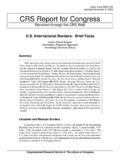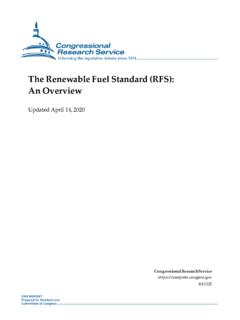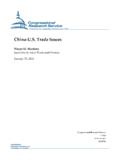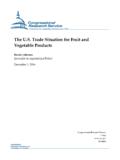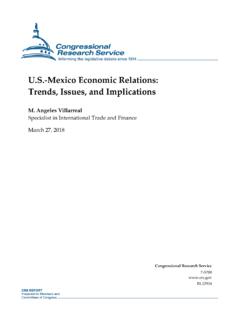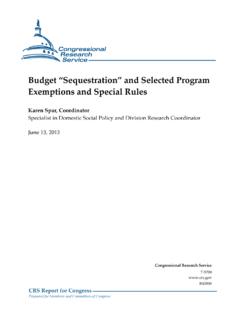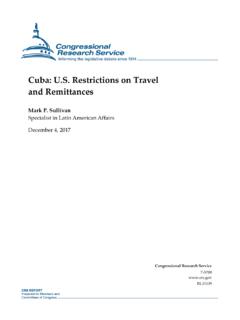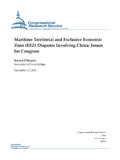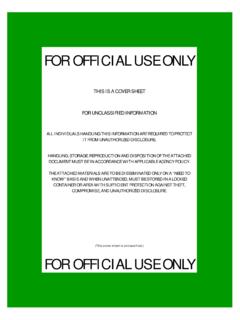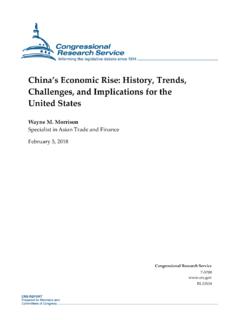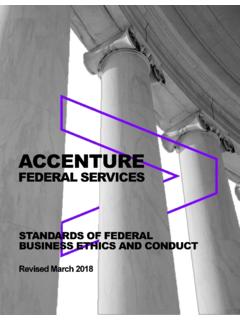Transcription of Noncitizen Eligibility for Federal Public Assistance ...
1 Noncitizen Eligibility for Federal Public Assistance : Policy Overview Alison Siskin Specialist in Immigration Policy December 12, 2016 Congressional Research Service 7-5700 RL33809 Noncitizen Eligibility for Federal Public Assistance : Policy Overview Congressional Research Service Summary The extent to which residents of the United States who are not citizens should be eligible for federally funded Public aid has been a contentious issue since the 1990s. This issue meets at the intersection of two major policy areas: immigration policy and welfare policy. The Eligibility of noncitizens for Public Assistance programs is based on a complex set of rules that are determined largely by the category of the Noncitizen in question and the nature of services being offered. Over the past 20 years, Congress has enacted significant changes in immigration policy and welfare policy. Congress has also exercised oversight of revisions made by the 1996 welfare reform law (the Personal Responsibility and Work Opportunity Reconciliation Act, 104-193) concerning the rules governing Noncitizen Eligibility for Public Assistance , and of legislation covering programs with major restrictions on Noncitizen Eligibility ( , Medicaid).
2 This report deals with the four major Federal means-tested benefit programs: the Supplemental Nutrition Assistance Program (SNAP, formerly food stamps), the Supplemental Security Income (SSI) program, Temporary Assistance for Needy Families (TANF) cash Assistance , and Medicaid. Laws in place for the past 20 years restrict the Eligibility of legal permanent residents (LPRs), refugees, asylees, and other noncitizens for most means-tested Public aid. noncitizens Eligibility for major Federal means-tested benefits largely depends on their immigration status; whether they arrived (or were on a program s rolls) before August 22, 1996, the enactment date of 104-193; and how long they have lived and worked in the United States. LPRs with a substantial work history (defined as 40 quarters of Social Security covered earnings) or military connection are eligible for the full range of programs, as are asylees, refugees, and other humanitarian cases (for at least five to seven years after entry).
3 Other LPRs must meet additional Eligibility requirements. For SSI, they are not eligible for the first five years even if they had a substantial work history ( , as a temporary worker prior to receiving LPR status). For SNAP, they generally must have been LPRs for five years or be under age 18. Under TANF, they generally are ineligible for five years after entry and then eligible at state option. States have the option of providing Medicaid to pregnant LPRs and children within the five-year bar; otherwise LPRs are ineligible for the first five years. Unauthorized aliens (often referred to as illegal aliens) are not eligible for most Federal benefits, regardless of whether they are means tested, with notable exceptions for emergency services ( , Medicaid for emergency medical care or Federal Emergency Management Agency disaster services). This report does not track legislation and will be updated as policy changes warrant. Noncitizen Eligibility for Federal Public Assistance : Policy Overview Congressional Research Service Contents Introduction.
4 1 Current Eligibility Policy .. 1 Citizens of the Freely Associated States .. 3 Related Immigrant Policies Affecting Eligibility .. 4 Deeming Rules .. 4 Systematic Alien Verification for Entitlements (SAVE) system .. 5 Federal and State Benefit Eligibility Standards for Unauthorized Aliens .. 5 Federal Benefits .. 5 State Benefits .. 6 Appendixes Appendix A. Noncitizen Eligibility for Selected Major Federal Programs .. 8 Appendix B. Overview of Alien Eligibility Law .. 11 Appendix C. Qualified Aliens .. 16 Contacts Author Contact Information .. 17 Acknowledgments .. 17 Noncitizen Eligibility for Federal Public Assistance : Policy Overview Congressional Research Service 1 Introduction The extent to which residents of the United States who are not citizens should be eligible for federally funded Public aid has been a contentious issue since the 1990s. This issue meets at the intersection of two major policy areas: immigration policy and welfare policy. Over the past 20 years, Congress has enacted significant changes in both areas.
5 Congress has also exercised oversight of revisions made by the 1996 welfare reform law (the Personal Responsibility and Work Opportunity Reconciliation Act, 104-193) concerning the rules governing Noncitizen Eligibility for Public Assistance , and of legislation covering programs with major restrictions on Noncitizen Eligibility ( , Medicaid). This report covers Noncitizen Eligibility in the four major Federal means-tested benefit programs: the Supplemental Nutrition Assistance Program (SNAP, formerly food stamps), the Supplemental Security Income (SSI) program, Temporary Assistance for Needy Families (TANF) cash Assistance , and Medicaid. It is organized into three main parts: an overview of existing Eligibility law for the four programs and the policies that preceded the 1996 act; an overview of related immigrant policies affecting Eligibility (specifically, the treatment of sponsored aliens);1 and a summary of the Eligibility rules for aliens residing in the United States illegally.
6 Appendices elaborate on the specifics of current Eligibility rules for the four major programs. Among other things, Title IV of the Personal Responsibility and Work Opportunity Reconciliation Act of 1996 (PRWORA, 104-193) established comprehensive restrictions on the Eligibility of noncitizens for means-tested Public Assistance with significant exceptions for those with a substantial work history or military connection. For legal permanent residents (LPRs)2 who were resident as of enactment of the law (August 22, 1996), the act generally had barred Eligibility (SNAP and SSI) or had allowed it at state option (Medicaid and TANF). For SNAP and SSI benefits, LPRs entering after August 22, 1996 (new entrants) also had been denied Eligibility . Refugees and asylees, however, were allowed Eligibility the first five years after entry/grant of status, then became ineligible after five years (unless they became citizens or qualified under another status). Nonimmigrants3 and unauthorized aliens were barred from almost all Federal Current Eligibility Policy Under current law, lawful permanent residents Eligibility for the major Federal means-tested benefit programs depends on their immigration status; whether they arrived (or were on a program s rolls) before August 22, 1996 (the enactment date of 104-193); their work history and military connection; their length of legal residence; and how states have exercised their 1 Alien is a term used in the Immigration and Nationality Act (INA, 8 1101 et seq.)
7 And defined as anyone who is not a citizen or national of the United States. The term is synonymous with Noncitizen and foreign national. 2 A lawful (legal) permanent resident (LPR) is a Noncitizen who is authorized to live and work permanently in the United States. The term is synonymous with immigrant and is colloquially referred to as a green card holder. 3 Nonimmigrants are foreign nationals admitted to the United States for a temporary period of time and an expressed purpose, such as tourists, foreign students, and guest workers. 4 For a fuller account of PRWORA s treatment of noncitizens and how the law evolved through the 1990s and 2000s, see Appendix B. Noncitizen Eligibility for Federal Public Assistance : Policy Overview Congressional Research Service 2 options to allow program participation by Following significant changes made by the 1997, 1998, and 2002 amendments,6 the basic rules are as follows:7 Refugees and asylees are eligible for food stamps/SNAP. Refugees and asylees are eligible for SSI benefits and Medicaid for seven years after arrival and are eligible for TANF for five After this term, they generally are ineligible for SSI, but may be eligible, at state option, for Medicaid and LPRs with a substantial work history generally 10 years (40 quarters) of work documented by Social Security or other employment records or a military connection (active duty military personnel, veterans, and their families) are eligible for the full range of programs.
8 LPRs are not eligible for SSI during the first five years even if they had 40 credits of earnings ( , as a temporary worker prior to receiving LPR status).10 LPRs receiving SSI as of August 22, 1996, continue to be eligible for SSI. Noncitizen SSI recipients are eligible for (and required to be covered under) Medicaid. Disabled LPRs who were legal residents as of August 22, 1996, are eligible for SSI. Disabled LPRs are eligible for LPRs who were elderly (65+) and legal residents as of August 22, 1996, are eligible for SNAP. LPRs who have been legal residents for five years or are children (under 18) are eligible for SNAP. LPRs entering after August 22, 1996, are barred from TANF and Medicaid for five years, after which their coverage becomes a state States have the option to cover LPRs who are children or who are pregnant during the first five years. 5 In addition, deeming rules (discussed later in this report) may affect Eligibility .
9 6 For a discussion of these amendments, see Appendix B. 7 Appendix C presents the basic Eligibility rules from a different perspective, using the term/category qualified alien which was established by the 1996 welfare reform law but not otherwise used in immigration or welfare law. 8 Refugee/asylee treatment is accorded to Cuban/Haitian entrants, certain aliens whose deportation/removal is withheld for humanitarian purposes, Vietnam-born Amerasians fathered by citizens, and victims of human trafficking. For those aliens who arrive in the United States without one of these forms of humanitarian relief, the seven- or five-year period begins after the date the aliens receive the status. 9 There had been a time-limited extension of SSI for nine years through FY2011 for refugees and asylees waiting to naturalize. 10 For SSI, the five-year bar for new entrants is irrelevant because they generally are denied Eligibility (without a time limit). 11 For SSI Eligibility , disabled LPRs must meet SSI permanent and total disability standards.
10 For food stamp Eligibility , disabled LPRs must be receiving governmental benefits for disability ( , SSI, Social Security disability payments, certain veterans disability benefits). 12 The Noncitizen Eligibility rules for the State Children s Health Insurance Program (CHIP) a program closely related to the Medicaid program are almost identical those for Medicaid. (The only difference is that after the five-year ban ( ) Noncitizen Eligibility for Federal Public Assistance : Policy Overview Congressional Research Service 3 Nonimmigrants and unauthorized aliens are ineligible for SNAP, SSI, and TANF. They are also ineligible for Medicaid with the exception of Medicaid for emergency States have the option to cover nonimmigrant and unauthorized aliens14 who are pregnant or who are children, and can meet the definition of lawfully residing in the United Appendix A lays out these rules in more detail, including special rules that apply to several limited Noncitizen categories: certain cross-border American Indians, Hmong/Highland Laotians, parolees and conditional entrants, and cases of abuse.)
